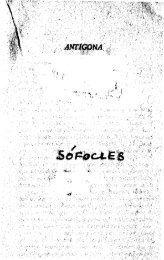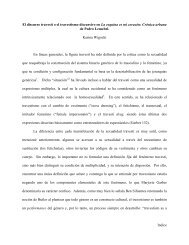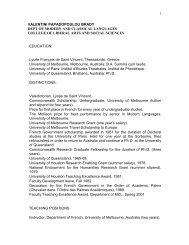Revenge, Justice, and the Law
Revenge, Justice, and the Law
Revenge, Justice, and the Law
Create successful ePaper yourself
Turn your PDF publications into a flip-book with our unique Google optimized e-Paper software.
16 THE WAYNE LAW REVIEW [Vol. 50:4<br />
under Retribution <strong>the</strong>ory, for <strong>the</strong>re to be just punishment, <strong>the</strong> victimizer must<br />
experience a sense of suffering, 62 <strong>and</strong> that such suffering must not be<br />
disproportionally less severe than <strong>the</strong> suffering which was experienced by<br />
<strong>the</strong> victim.<br />
Without requiring an adequate level of suffering, a wrongdoer would not<br />
pay for his wrongful act. 63 Suffering may take many forms. It may consist<br />
of loss of freedom through incarceration, loss of financial assets through<br />
fines, <strong>and</strong> perhaps even loss of life. Suffering need not be a distinct <strong>and</strong><br />
separate element of punishment. For example, by imposing <strong>the</strong> punishment<br />
of incarceration, <strong>the</strong> dual goals of incapacity <strong>and</strong> suffering could be<br />
The instinct for retribution is part of <strong>the</strong> nature of man, <strong>and</strong> channeling that<br />
instinct in <strong>the</strong> administration of criminal justice serves an important purpose in<br />
promoting <strong>the</strong> stability of a society governed by law. When people begin to<br />
believe that organized society is unwilling or unable to impose upon criminal<br />
offenders <strong>the</strong> punishment <strong>the</strong>y “deserve,” <strong>the</strong>n <strong>the</strong>re are sown <strong>the</strong> seeds of<br />
anarchy of self- help, vigilante justice, <strong>and</strong> lynch law.<br />
Gregg v. Georgia, 428 U.S. 153, 183 (1976), citing Furman v. Georgia, 408 U.S. 238, 308<br />
(1972) (Stewart, J., concurring).<br />
One criticism of Retribution is that its justification relies upon its own assertion that<br />
a “wrongful act must be punished.” See, e.g., Wilson, supra note 52, at 281 (“To justify<br />
punishment on <strong>the</strong> grounds that punishment is ‘just’ or ‘morally good’ is circular.”). In<br />
response to this criticism, Graeme Newman argues that it is possible for a statement to be<br />
inherently right, <strong>and</strong> so argues that “<strong>the</strong> statement ‘A wrongful act must be punished’ is not<br />
just an assertion, it is a statement of fact. There has never been a time in history when<br />
wrongful acts (that were perceived as wrongful acts) were rewarded. In fact, such a<br />
possibility is plainly ridiculous.” Id. at 191.<br />
62. See, e.g., HART, Prolegomenon to <strong>the</strong> Principles of Punishment, 4 (xxxx) (“It<br />
[Punishment] must involve pain or o<strong>the</strong>r consequences normally considered unpleasant.”);<br />
HART, Postscript: Responsibility <strong>and</strong> Retribution, supra note 59, at 231 (“The justification<br />
for punishing men under such conditions is that <strong>the</strong> return of suffering for moral evil<br />
voluntary done, is itself just or morally good.”).<br />
63. Barton also argues that retribution recognizes <strong>the</strong> wrongdoer as a mature <strong>and</strong><br />
competent individual by holding him accountable for his wrongful acts. BARTON, supra note<br />
30, at 97. C.S. Lewis argued similarly, <strong>and</strong> in so doing criticized <strong>the</strong> Utilitarians:<br />
Their very kindness stings with intolerable insult. To be “cured” against one’s will<br />
. . . ..is to be put on a level with those who have not yet reached <strong>the</strong> age of reason or<br />
those who never will. . . ...But to be punished, however severely, because we have<br />
deserved it, because we “ought to have known better” is to be treated as a human<br />
person made in God’s image.<br />
C.S. Lewis, The Humanitarian Theory of Punishment, in 6 RES JUDICATAE 224, 228 (1953).











